

Presidential Search Prospectus
About John Cabot University
John Cabot University (JCU) is a private, accredited American liberal arts university offering undergraduate and graduate degree programs and study abroad opportunities to students from over 75 countries. JCU’s distinctive location in Rome, Italy allows for an immersive global education, blending the best of American academic traditions with the rich cultural heritage of Italy and Europe. Our close-knit community welcomes students from all backgrounds, creating a safe environment where differences are celebrated and lasting friendships are formed.
History
John Cabot International College, as the University was first known, opened its doors in 1972 to 31 students from 11 different countries. It was affiliated with Hiram College in Ohio until 1997, when JCU became a candidate for regional accreditation from the Middle States Association. The founders’ vision was to establish an American university in Italy to provide students with the opportunity to expand their horizons and develop an international mindset. Named after Giovanni Caboto (John Cabot), the fifteenth-century Italian explorer who set sail from Bristol under the English flag and reached Newfoundland in North America in 1497, the University has always taken pride in being a bridge across the Atlantic. The spirit of intellectual questing and exploration that is central to the liberal arts tradition is also reflected in the University’s Latin motto, Explorando excello, which translates to “I excel by exploring.”
Accreditation
The mission of the University is to provide an educational experience firmly rooted in the American tradition of the liberal arts and solidly international in orientation. The academic programs are designed to use to the fullest extent the special resources of a multicultural faculty, an international student body, and the extraordinarily rich culture and history of Rome and the surrounding region. JCU is committed to:
• academic excellence and lifelong learning
• intellectual freedom, respect, and integrity
• preparing students to become leaders in a globalized world

About John Cabot University
Mission and Values
About John Cabot University
John Cabot University is accredited by the Middle States Commission on Higher Education. It received initial accreditation in 2003.

With the city of Rome as its campus, small classes, and a welcoming international community, John Cabot University offers an academic experience like no other. Students can choose from 15 undergraduate degrees, 23 minors, an M.A. in Art History, and an M.A. in International Affairs. The curriculum emphasizes critical thinking, interdisciplinary learning, and experiential education to provide the skills necessary to navigate any career opportunity. Learning also takes place in the living classroom that is the city of Rome, many courses incorporating visits to museums, archaeological sites, and historic landmarks. Through the Career Services Office, students have opportunities for internships at multinational companies, international organizations, NGOs, consulates, government offices, and museums. Students also have the option to study abroad independently or through a variety of direct exchange programs throughout the world.
JCU's alumni have been accepted into prestigious graduate schools worldwide, such as Columbia, Johns Hopkins, Oxford, Cambridge, and the London School of Economics. Graduates have also embarked on successful careers at major multinational companies, financial institutions, cultural organizations, and diplomatic entities, including Bloomberg, IBM, the World Food Program, and the World Bank.
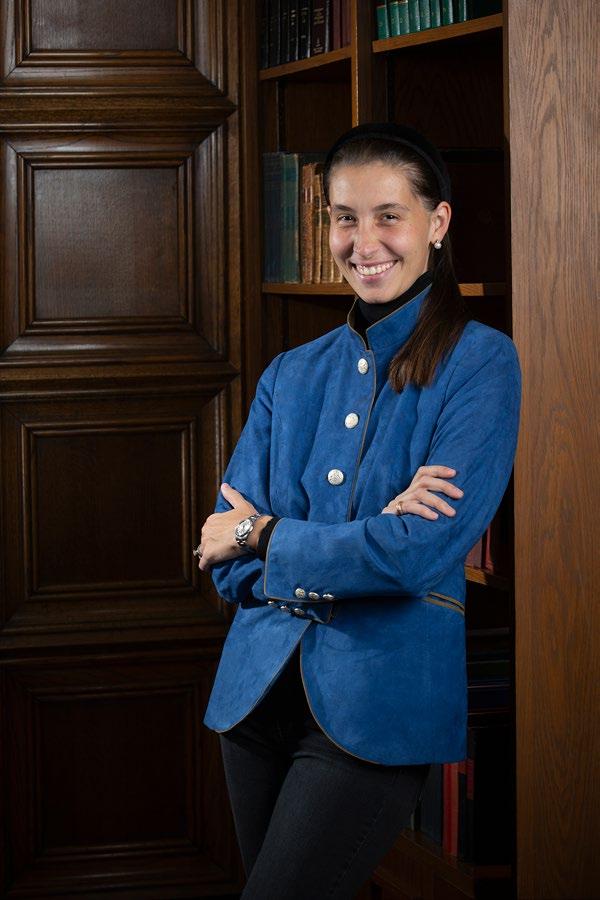
Anna Bottinelli
Originally from Florence, Italy, Anna Bottinelli earned a B.A. in Art History with a minor in Business Administration from JCU in 2010. She was also president of Student Government and helped organize the first International Student Government Conference of American universities abroad. She completed an M.A. in Art History from the Courtauld Institute of Art in London in 2011. In 2014, she joined the Monuments Men and Women Foundation, which seeks to preserve and continue the work of the Monuments Men and Women, a group of scholar-soldiers who saved millions of monuments and cultural treasures from the destruction of World War II and theft by the Nazis. Anna was appointed President of the Foundation in 2019. During her tenure, Anna has overseen numerous restitutions of cultural objects to individuals and museums in Europe. In 2024, she was featured in British auction house Christie’s “6 influential women on building a more equitable art world and the trailblazers who inspire them.”
Says Anna, “An email from Professor Lila Yawn led to my first job as a researcher on the topic of art thievery during WW II. Without such close relationships with professors, I wouldn’t have had this kind of opportunity. JCU provided me with the skills to thrive among some of the best art scholars in the world.”

Natalia Stanusch
Natalia Stanusch, who hails from Poland, graduated from JCU in Spring 2022 with a double major in Communications and Art History. After earning her M.A. in New Media and Digital Culture from the University of Amsterdam (UvA), she has combined working as a Researcher at the European NGO AI Forensics with doing a Ph.D. at the Amsterdam School for Cultural Analysis (ASCA) at UvA. Her research focuses on new methodological approaches for
During her studies at JCU, Natalia had the chance to join international scholars as a speaker at the 5th JCU Posthuman Studies Workshop, and to publish her research on the website of the prestigious Institute of Network Cultures in Amsterdam. She also worked as an intern in the Web Communications Office.
“The opportunity to choose among different courses from various subjects that JCU and the American liberal arts approach offered, had a great impact on my professional and academic growth. The double major helped me shape my academic curiosity and voice, as it provided me with plenty of opportunities to venture into different fields, conduct, and present research in numerous ways, and get precious feedback from faculty. I am truly grateful for the unforgettable and thought-provoking classes I took, but also for the amazing mentorship that I received from my professors at JCU,” says Natalia.
Frank J. Guarini School of Business
The Frank J. Guarini School of Business provides excellence in business education that capitalizes on the University’s liberal arts tradition and international environment to build an ecosystem of ethical, compassionate, and innovative business leaders who are prepared to engage in an interconnected, complex world. The School of Business received accreditation from the Association to Advance Collegiate Schools of Business (AACSB) in 2022. John Cabot is one of fewer than 6% of business schools worldwide and the first American university in Europe to have earned this prestigious accreditation.
Institute for Creative Writing and Literary Translation
Since its founding in 2009, the Institute for Creative Writing and Literary Translation has become a thriving community of and for writers in Rome. With workshops in the major genres (fiction, poetry, creative nonfiction) and literary translation, the Institute is the place for creative writing students to spend serious time on their writing as they get to know the Eternal City.
Institute for Entrepreneurship
The JCU Institute for Entrepreneurship (IFE) provides a world-class entrepreneurial education, instilling a strong sense of social responsibility, and building an international network of researchers, practitioners, and leading innovation hubs. Any student who wants to learn more about entrepreneurship can pursue specialized academic paths, participate in national and international competitions sponsored by IFE, and develop skills through a variety of internships and certificate programs.
The JCU Institute for Entrepreneurship (IFE) provides a world-class entrepreneurial education, instilling a strong sense of social responsibility, and building an international network of researchers, practitioners, and leading innovation hubs. Any student who wants to learn more about entrepreneurship can pursue specialized academic paths, participate in national and international competitions sponsored by IFE, and develop skills through a variety of internships and certificate programs.
Faculty
JCU's faculty members are internationally recognized scholars who bring a global perspective to the classroom. Over 90 percent of full-time faculty members hold Ph.Ds. or other terminal degrees, many from prestigious institutions such as Brown, Columbia, Harvard, Johns Hopkins, the London School of Economics and Political Science, the University of Cambridge, the University of Oxford, the University of Michigan, the University of Wisconsin-Madison and Yale, among many others. Small class sizes create an unparalleled learning environment where professors become mentors for students, even after graduation. Students also have the opportunity to do research assistantships, working directly with professors in a variety of disciplinary areas.
Enrollment
John Cabot University has an enrollment of approximately 1,800, with about 900 degree-seeking students. Each year more than 2,000 students come to JCU to study abroad either independently or through programs with over 100 partner universities including Northeastern, the University of Southern California, Michigan State University, and the University of Notre Dame. By bringing together degree-seeking students from over 75 countries with our visiting American and international students, John Cabot creates a unique student body that thrives in the vibrant city of Rome.
students from 1,800 75 countries


Professor Michael Driessen
Michael Driessen is Professor of Political Science and International Affairs and the inaugural Director of the M.A. program in International Affairs at John Cabot University. He received his Ph.D. from the University of Notre Dame and has been a post-doctoral fellow at Georgetown University's School of Foreign Service in Doha, Qatar as well as a Jean Monnet Fellow at the European University Institute in Florence.
Professor Driessen's research focuses on the role of public religions in Catholic and Muslim societies, and he teaches courses such as Religion and Global politics, Politics of the Middle East and Mediterranean, and War, Peace and Conflict Resolution. His main interests include the relationship between religion and democratization processes in the Mediterranean region; interreligious engagement and peacebuilding; political Islam and political Catholicism; and theories of religious humanism.
His books include The Global Politics of Interreligious Dialogue (Oxford University Press, 2023), Human Fraternity and Inclusive Citizenship: Interreligious Engagement in the Mediterranean (ISPI, 2021; co-edited with Fabio Petito and Fadi Daou), and Religion and Democratization (Oxford University Press, 2014). He has published scholarly articles in Comparative Politics, Sociology of Religion, Politics and Religion, Constellations, and Democratization.
“One of the things I have always loved about JCU is that the culture of the student body here is so alive, both intellectually and creatively. If you want to really grapple with the big questions facing global politics today and invest yourself in the study of ideas and practices, then I think John Cabot University is a magnificent place to do that,” says Professor Driessen.
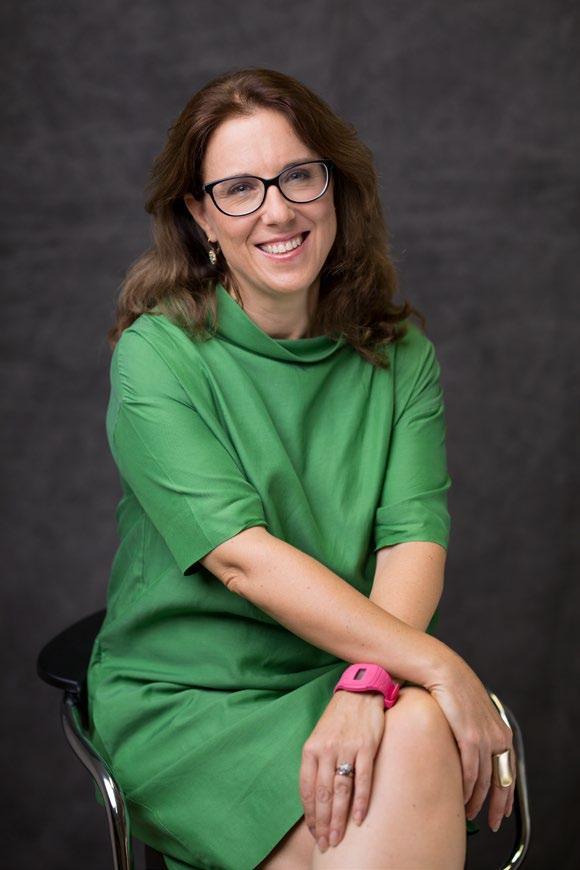
Professor Isabella Clough Marinaro
Isabella Clough Marinaro, who holds a Ph.D. from the University of Bath in the U.K.,is Professor of Sociology and Italian Studies. She recently developed JCU’s new Minor in Sociology and is working on building one in Criminology. In fact, many of her courses are in that field (Introduction to Criminology; Policing and Society, Globalization and Crime). Her course in Green Criminology, for example, motivates students to see that advocating for the environment is ultimately about fostering community, peace, and social justice. She has always taught across Departments, and part of her teaching is anchored in contemporary Italy, using Rome as her classroom (Contemporary Italian Society, Rome Modern City, Researching Rome: Fieldwork in the City).
Her research similarly moves between studying contemporary Italy and changing forms of crime and deviance. Her latest book is Inhabiting Liminal Spaces: Informalities in Governance, Housing, and Economic Activity in Contemporary Italy (Routledge, 2022). She previously co-edited two books: Italian Mafias Today: Territory, Business and Politics (Elgar, 2019) and Global Rome: Changing Faces of the Eternal City (Indiana University Press, 2014). She has a new co-edited book coming out in early 2026 titled Living Rome. Space, Identity and the Politics of Belonging, which includes chapters by various JCU professors and alumni. In addition to another big book project, she is currently doing fieldwork exploring how social movements in Italy campaign on issues of crime, legislative reform and social justice.
Students from different majors have benefitted from the opportunity to work with Professor Clough Marinaro as research assistants. “What is important is not the discipline you are formally in, but the elasticity of your mind and your desire to learn how research is done and to help find creative and collaborative ways to do it,” she says.

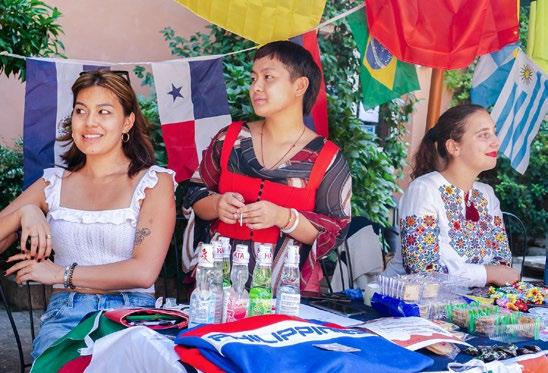



Located in the lively Trastevere neighborhood of Rome within walking distance of major historical and cultural sites, JCU provides a unique blend of old-world charm and modern academic facilities. The University’s urban campus consists of six buildings as well as additional art and design studios, two residence halls and numerous off-campus apartments. JCU’s facilities feature modern classrooms, state-of-the-art technology, study lounges, and scenic terraces.
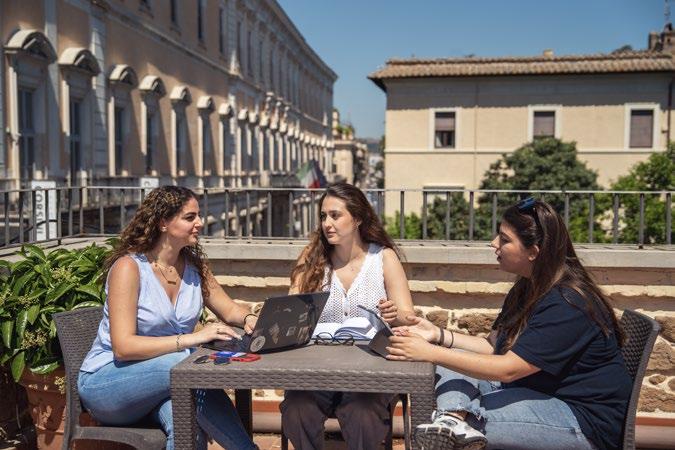

Guarini Campus Frohring Campus
From a small villa with three classrooms in a residential area of Rome, JCU moved to the Trastevere neighborhood in the heart of the city in 1991. Located at Via della Lungara 233, the Guarini Campus hosts the Aula Magna Regina auditorium as well as the Frohring Library, recognized as one of the finest academic English-language collections in Rome. The Guarini campus also includes numerous study rooms, media production facilities, a meditation garden, and various administrative offices.
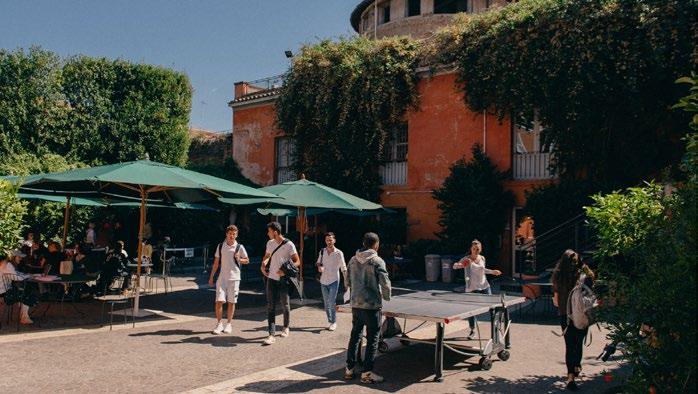
JCU's Frohring Campus, inaugurated in 2008, is located at Lungotevere Raffaello Sanzio 12, on the banks of Rome's famous Tiber River and a five-minute walk from Guarini. In addition to classrooms, the Campus houses offices such as Student Engagement and Immigration Services. It is also home to John Cabot University's cafeteria, the Tiber Cafe, which serves breakfast, lunch, and dinner and offers various meal plan options.

Caroline Critelli Guarini Campus
Inaugurated in 2018, Caroline Critelli Guarini Campus (Piazza Giuseppe Gioachino Belli 11), is the first property owned by John Cabot University. It houses classrooms, administrative offices, and a specialized classroom that can be used for physics and basic electrical engineering courses. The campus was named after Caroline Critelli Guarini (1900 – 2001), mother of the Hon. Frank J. Guarini, Chair Emeritus of the JCU Board of Trustees and a generous benefactor of the University.

Foresteria Building
The building that in 2023 became the home of the Center for Graduate Studies, dates back to 1495. Located at Via della Lungara 231, it was built as a home for Cardinal Alessandro Farnese, the future Pope Paul III. In the first half of the 19th century, it passed on to the powerful Bourbon family. Since 1934 it has been part of the adjacent Accademia dei Lincei, the oldest academy in the world dedicated to the study of the humanities and natural sciences.

New Campus
Acquired in 2025, the New Campus, also located along the Tiber River, is the latest addition to JCU’s campus buildings. Home to the Guarini Center for the Arts, it has state-of-the-art studios for printmaking, painting, design, and photography and is equipped with specialized facilities including a lighting studio, a dark room, and a MAC lab, with industry-standard software. The campus also houses the Dean of Students office, flexible event spaces, classrooms, faculty offices, and a coffee shop with an


Tuition and Financial Aid
JCU offers competitive tuition rates and a combination of merit and need-based awards. Approximately 85% of degree-seeking students receive financial assistance. The University maintains a fiscally responsible budget and leverages strategic partnerships and philanthropic support to ensure affordability and access.


Leading strategic direction and planning in partnership with the Board, the President will provide leadership for the University, working with an internationally recognized faculty, a talented senior leadership team, long-term donors and trustees, supporters, trustees, and a thriving student, alumni, and parent community.
The Role of the President
The President will directly lead, supervise, and evaluate the Executive Cabinet, consisting of the following positions:
• Vice President of Academics
• Vice President for Strategic Initiatives and Operations
• Dean of Academic Affairs
• Director of Finance
• Chief of Staff, Director of Administration, and Secretary of the Board
• Executive Consultant for Finance and Operations
The President also oversees additional positions, including:
• Director of the Graduate Studies Center and Career Services
• Director of Enrollment and Marketing
• Director of Development, Alumni Affairs and Special Events
• Executive Office Manager
Key Priorities for the Next President
Overarching Goals
• Continue to improve the University’s international standing as a distinguished American institution of higher education in the heart of Rome;
• Continue to enhance the institution’s reputation for teaching excellence, faculty research, publication and creative output, and the community service through strategic marketing;
• Produce graduates who contribute in the fields of business, public service, and academe and aspire to the highest ideals of professional and personal achievement;
• Demonstrate the value of a John Cabot education through effective assistance in job placement and graduate school admission;
• Maintain a campus environment that encourages sensitivity to the ethnic and cultural origins of the members of the University community;
• Foster civil discourse on contemporary issues through public lectures, forums, and conferences;
• Continue to provide a broad spectrum of student activities, clubs, travel, and other opportunities that reflect the talents and interests of an international student body and faculty;
• Develop courses, seminars, and programs that reflect the challenges of a pluralistic society;
• Continue to provide a physical environment that invites teaching and learning and encourages excellence in both students and faculty;
• Promote a sound and efficient financial environment that supports the institution’s current operations and future goals through targeted fundraising initiatives, including endowment growth and cultivating a culture of philanthropy;
• Continue to support an active alumni relations program that encourages participation in student recruiting, career services, program assessment, and financial development; and
• Preserve the character of the University as an American institution of higher education by attracting a significant percentage of students who are U.S. citizens, as well as faculty with U.S. academic credentials and/or experience.
Key Priorities for the Next President
Championing John Cabot
The next President will articulate and document a strategic vision for the coming decade that amplifies John Cabot’s strengths and addresses its challenges. Building on the institution’s growing reputation, the next President will be an articulate spokesperson for the University and will promote its excellence to American, Italian, and international audiences.
The successful candidate will be expected to undertake the following:
• Serve as an effective advocate for the institution with Italian and American educational, governmental, and cultural entities, including regulatory authorities;
• Develop mutually beneficial relationships with the community, especially in Trastevere, Rome, and Italy and the Italian American community throughout the United States;
• Leverage the exceptional beauty and location of the John Cabot campus in Rome as a premier location for learning in a country whose history is a foundation for Western philosophy, art, and science;
• Recruit students from new geographical locations, including from South and Central America, Asia, and Africa;
• Demonstrate a commitment to the principles and values of an American liberal arts and business education;
• Work closely with John Cabot’s partner institutions in the United States, Europe, and across the globe to secure the best educational outcomes for students, faculty, and staff; and
• Develop government, corporate, foundation, and private grantmaking and philanthropic support to foster program innovation and excellence and continue to grow the endowment and annual fundraising program.
Key Priorities for the Next President
Thinking Strategically
John Cabot’s next President will shape a vision that builds on the institution’s recent growth and its operating budget of approximately $60 million per year. The President must be a creative and innovative thinker and have a strong business acumen. The ideal candidate must have the ability to guide the institution successfully through constant changes and challenges in the economic and educational landscape both in Italy and internationally. In order to keep John Cabot ahead of the curve, the President must lead by emphasizing the following areas:
• Work with American, Italian, and European Union public agencies and individuals to support academic programs, initiatives, and facility improvements;
• Improve communications with, and contributions from, John Cabot’s network of more than 10,000 alumni;
• Implement best practices in higher education management and governance;
• Manage complex and wide-ranging stakeholder opinions;
• Maintain high-caliber members of the Executive Cabinet, faculty, and staff through proper hiring, retention, and management;
• Continue improvement of facilities and tackle deferred maintenance issues;
• Create enrollment and retention strategies which will safeguard against potential unpredictable demographic shifts and economic uncertainties;
• Promote a culture of innovation, particularly in the enhancement of operational efficiencies and the creation of novel and creative revenue streams;
• Collaborate closely with the Board of Trustees, including effective preparation of substantive in-person and virtual Board and Committee meetings;
• Promote best practices in higher education and Board governance, and presentation of potential new members of the Board of Trustees; and
• Cultivate and present potential new members for appointment to the Board of Trustees.
Key Priorities for the Next President
Empowering the John Cabot Community
John Cabot’s President has a distinctive role in overseeing an international student body, comprised of both degree-seeking and visiting study abroad students, and a Rome-based staff and faculty. Balancing Italian and American higher education rules, regulations, and cultures, the next President will need to emphasize the following areas:
• Preserve John Cabot’s distinctive commitment to baccalaureate, graduate, and study-abroad education;
• Support overall academic excellence in teaching, scholarship, and institutional service;
• Ensure the recruitment, development and retention of talented faculty and staff;
• Optimize human resources and organizational structure(s) following a period of rapid institutional growth;
• Provide opportunities for students from Italy and around the world to celebrate American and Italian culture;
• Play a visible mentoring and motivational role in the daily lives of students, faculty, staff and the greater University community and municipality;
• Respect the academic tradition of shared governance;
• Celebrate the University’s history and promote the commitment to its future;
• Demonstrate a commitment to the institutional mission to protect and promote academic freedom and civil discourse;
• Communicate to the John Cabot community and externally with authenticity, passion, thoughtfulness, and clarity;
• Maintain the highest level of integrity and ethical behavior; and
• Foster a strong, open, and collaborative relationship with the Board of Trustees, faculty, staff, students, parents, and alumni.
Qualifications and Key Success Factors
Building on John Cabot’s tradition of innovation and excellence, the next President must harness the best ideas and best practices to continue its upward trajectory. The President should be a wise steward of the University’s resources and work to develop a financial model that increases revenue while also exploring new opportunities that will enhance the institution’s financial future.
Because the President must embody the values of John Cabot and its commitment to American educational excellence, candidates are expected to hold strong academic credentials, including a terminal degree in their field of study. A preference will be given to candidates with a commitment to teaching, scholarship, and higher education administrative experience. Knowledge of, and experience in Italy, the Italian language, and best practices of international education are preferred.
Highly qualified candidates for the John Cabot Presidency should also demonstrate many of the following attributes:
• Experience as a strategic leader of a complex organization;
• An understanding of admissions, enrollment, and retention issues in an international context;
• A willingness and curiosity to understand Italy and the Italian educational landscape;
• Excellent communication skills, including public speaking, writing, and active listening;
• Knowledge of the Italian business and bureaucratic landscape and a willingness and curiosity to understand its educational system;
• Understanding of how to maintain and develop both the incoming study abroad programs and the four-year degree program;
• Strong managerial skills, including financial acumen, campus planning, entrepreneurial spirit, budgeting knowledge, cabinet leadership, and working with a Board of Trustees;
• Superb emotional intelligence, including empathy, humility, and optimism and the ability to connect with diverse constituents, including undergraduate and graduate students; and
• A successful fundraising record or personality traits that suggest high potential for success in this area.

